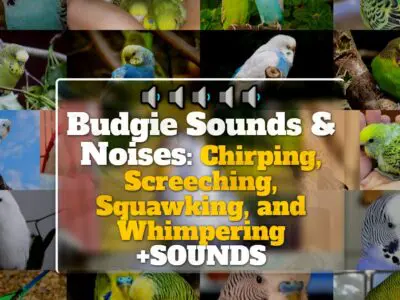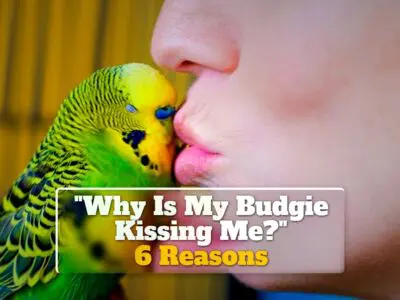Having spent years working with animals and sharing my own home with budgies, I’ve learned that each sound they make has a meaning.
The cheerful chirp is easy to love, but the squawk? That can be a tough nut to crack.
This piece will help budgie owners understand what squawking means, the reasons behind it, and how to gently discourage excessive squawking.
Budgie squawking can be due to numerous reasons such as fear, annoyance, hunger, thirst, injury, hormonal changes, seeking attention, or expressing joy.
Squawking can be mitigated by moving or covering the cage, interrupting the behavior gently, socializing more with the budgie, using calming products like Avicalm, or simply letting the bird express itself.
What Is Squawk In Budgies?
A squawk, unlike the melodious chirping we often associate with budgies, is a harsher, louder, and more intense sound.
This sound is not without purpose.
On the contrary, it’s a language in itself, one that budgies use to express a range of emotions and responses to their environment.
To fully grasp what squawking is, consider the example video provided.
Notice the distinct tone and volume difference compared to the regular chirps.
It’s almost as if the bird is trying to make its feelings, whatever they might be, heard over any potential noise.
What Is The Difference Between Squawking And Chirping In Budgies?
While both squawking and chirping are a part of the budgie’s vocal repertoire, they are vastly different.
Chirping, the soft and rhythmic sound budgies make, is usually a sign of contentment and happiness.
Squawking, on the other hand, has a harsher tone and is louder.
It’s a more urgent sound, usually indicating distress, fear, or demand for attention.
Why Is My Budgie Suddenly Starting To Squawk?
Changes in your budgie’s behavior, such as sudden bouts of squawking, might cause you to worry.
A host of reasons could be behind this shift in communication, from fear to hunger, or even hormonal changes.
As you explore this article further, you’ll encounter a deeper understanding of these causes.
Why Does My Budgie Squawk? Reasons
Fear And Annoyance
When it comes to understanding the squawking habits of budgies, fear and annoyance play significant roles.
These small birds are highly sensitive to their environment and will often vocalize their discomfort through a sharp squawk.
Fear in budgies can stem from various sources such as the sight of a potential predator, sudden movements, or loud noises.
They may also squawk out of annoyance if they’re uncomfortable in their surroundings, such as in an overly crowded cage or when exposed to persistent, unwanted stimuli.
Recognizing these triggers and mitigating them is a crucial step towards curbing excessive squawking.
Once upon a time, I shared my abode with a little budgie named Ollie. Ollie was a charming feathered friend, known for his sweet, melodious chirping that added a soothing harmony to our home. However, things took an unexpected turn when Ollie suddenly switched from his gentle chirping to persistent squawking. Each day, the house would reverberate with Ollie’s loud squawking, turning our peaceful home into a noise hub. As someone who had spent a decade working with animals, I knew something was amiss. Squawking in budgies could signify several things. It could be an expression of fear, annoyance, hunger, pain, or a cry for attention. I began by observing Ollie closely. I noticed that his squawking would increase whenever the neighbor’s dog was around. The squawking, it appeared, was an expression of fear or annoyance at the intrusive presence. To address this, I moved Ollie’s cage to a quieter spot, away from the window overlooking the neighbor’s yard. The change in location did wonders. Ollie seemed more at ease, and the squawking reduced significantly.
Hunger And Thirst
Hunger and thirst are fundamental needs of every living creature, and budgies are no exception.
These avian companions have a distinct way of communicating their needs, and squawking is often a call for nourishment.
If your budgie is squawking more than usual around feeding time, it might be signaling its hunger or thirst.
Their diet should consist of a balanced mix of seeds, fruits, vegetables, and fresh water, ensuring that they receive all necessary nutrients.
It’s essential to establish a regular feeding schedule and always have fresh water available to prevent discomfort that might lead to squawking.
Injury, Pain
Injury or pain can trigger a significant change in your budgie’s behavior, particularly in their vocalization.
If a budgie is hurt or unwell, squawking becomes a tool to express discomfort and seek attention.
The sound might be more intense, frequent, or different from their usual squawking.
If your budgie suddenly starts to squawk more, especially when moving or interacting with you, it may be time for a health check-up.
Regular inspections for any visible injuries and annual check-ups with a vet can help identify any underlying health issues that could be causing pain and hence, the increased squawking.
Hormonal Temper
Budgies, much like other birds, undergo hormonal fluctuations, particularly during the breeding season.
During such times, you may notice a sudden surge in their squawking.
This is a part of their hormonal temper, a result of the changes their bodies are going through.
You might find your normally calm budgie becoming more vocal, more agitated, and more inclined to squawk.
The squawking can also be accompanied by territorial or aggressive behaviors.
Understanding that this is a natural process, and providing a calming, secure environment can help your budgie navigate these hormonal changes without resorting to constant squawking.
Mating (Breeding) Season
During the breeding season, budgies tend to become more vocal.
This is a natural behavior intended to attract a mate.
Squawking, in this case, is your budgie’s way of advertising its availability and interest in mating.
The sound can be louder, longer, and more frequent, creating a unique ‘mating call.’ It’s an instinctive behavior and not a cause for concern.
However, it can increase the overall noise level in your home during this period.
Getting Attention
Budgies are inherently social creatures, and they crave interaction and engagement.
They often squawk to get attention when they feel ignored or when they are alone.
This squawking can be perceived as a call for company, an invitation for play, or a plea for interaction.
If a budgie feels it’s not getting enough attention, it might resort to persistent squawking as a form of protest or a call for care.
Express Their Joy And Excitement
Contrary to what many believe, not all squawking is a sign of distress or discomfort.
Budgies also use squawking as a way to express their joy and excitement.
If your budgie is in a particularly good mood, perhaps playing with a new toy, interacting with a companion, or just having a good day, they might let out joyful squawks.
These are usually easy to distinguish from distress calls, as they’re often coupled with happy behaviors like hopping around, fluttering wings, or playfully pecking at toys or perches.
Understanding that squawking isn’t always negative can help you appreciate these joyous outbursts as part of your budgie’s unique personality.
How Do I Stop My Budgie From Squawking?
Move The Cage
At times, a simple change in location can help.
A quieter spot or one with a better view might just do the trick.
Cover The Cage
Covering the cage can provide a sense of security and help reduce squawking, particularly during the night or times of distress.
Interrupt The Squawking Behavior With A Squirt Bottle Or Anything
A gentle squirt of water can help interrupt and discourage excessive squawking.
But remember, it’s vital to ensure this is done gently and without causing fear or harm.
Socialize With Your Budgie
Spend more time with your budgie.
Interacting with them can help alleviate any feelings of loneliness that might be causing the squawking.
You Can Try Products Such As Avicalm
Avicalm, a calming supplement for birds, can help reduce squawking.
It’s non-toxic and can be mixed with food.
If Nothing Is Stopping Him, Go No Further. Let It Squawk
Sometimes, despite your best efforts, your budgie may continue to squawk.
In such cases, it’s best to let them be.
It might just be their way of expressing themselves.
FAQs About Budgie Squawking
Why Is My Bird Squawking So Much And Loud?
Loud and persistent squawking can indicate a variety of things.
It could be a sign of stress, fear, hunger, or even just a call for attention.
Do Budgies Squawk For Attention?
Yes, budgies often squawk to get attention, particularly if they feel ignored or lonely.
Do Budgies Squawk When Happy?
Surprisingly, yes! Squawking isn’t always a negative sign.
Budgies can squawk when they’re feeling joyous or excited.
Why Are My Budgies Squawking At Each Other?
Budgies squawking at each other might be a part of their social interaction, a form of playful banter, or an expression of annoyance or territoriality.
Understanding the context can help discern the reason.


